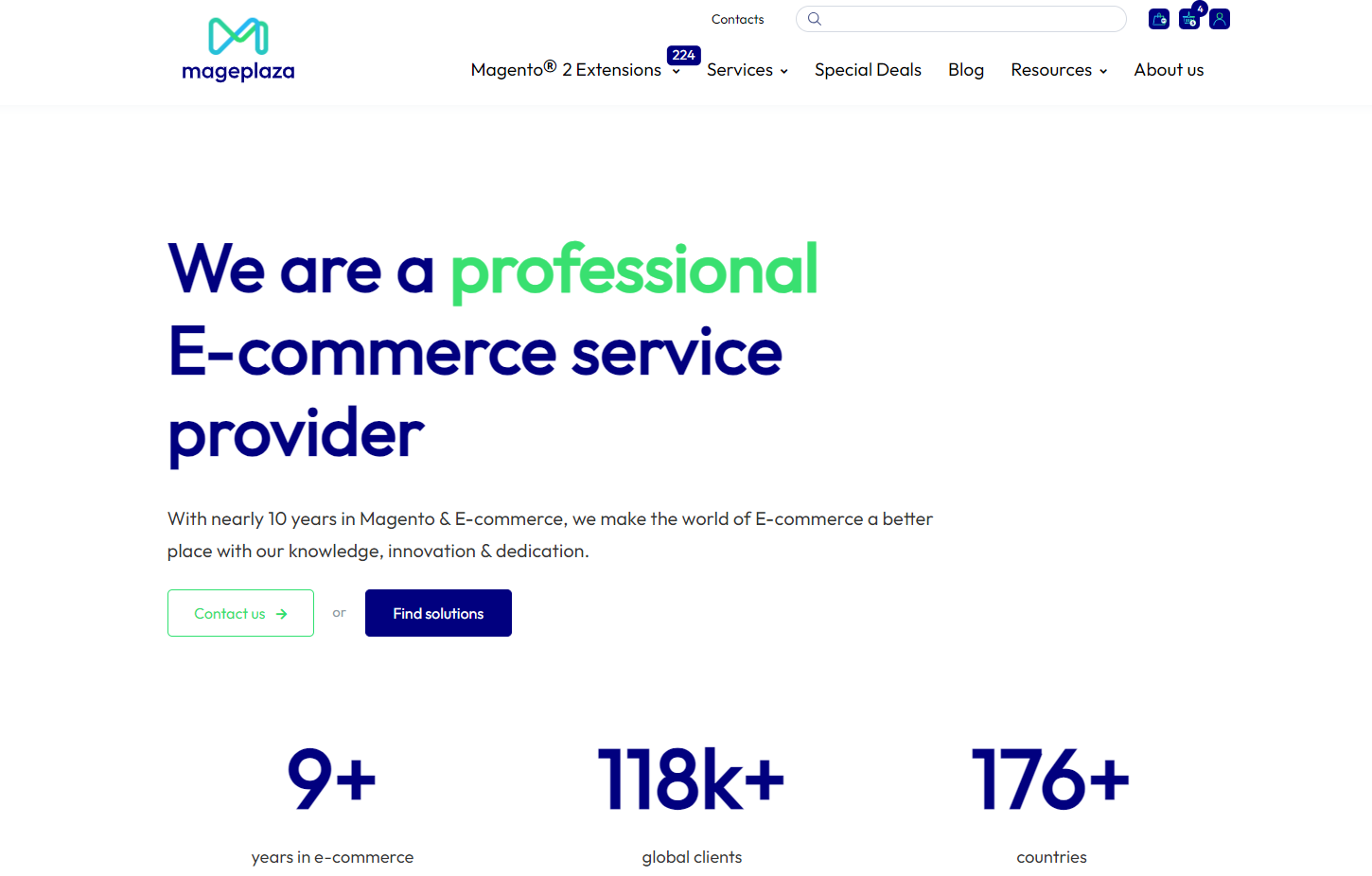Hyvä Theme is Now Open Source: What This Means for Magento Community - Mageplaza
Hyvä is now Open Source and free. Discover what changed, what remains commercial, how it impacts the Magento ecosystem, and how to maximize its full potential.
Vinh Jacker | 08-02-2023

Are you tired of struggling to figure out how much software development will cost you? If so, you’re in luck! We’re about to explore the cost of outsourcing software development.
Whether you’re a startup with limited funds or an experienced entrepreneur trying to reduce costs, outsourcing software development has become an attractive choice. Let’s delve into it now!
Outsourcing in software development refers to hiring external companies or individuals to handle specific tasks or services, reducing in-house resources, and involving third-party organizations in different locations.
Companies may choose to outsource software development for various reasons, including:
Cost savings. Outsourcing can be more cost-effective compared to maintaining an in-house development team, especially in regions where labor costs are lower.
Access to specialized skills. Outsourcing enables companies to access specialized skills and expertise from a broader talent pool, making it useful for niche technologies and complex projects.
Increased flexibility and scalability. Outsourcing offers quick resource scaling for projects with fluctuating workloads or short-term projects, enhancing agility.
Focus on core competencies. Outsourcing non-core software development allows companies to focus on core business functions and strategic initiatives.
Read more: 30+ Best software outsourcing companies in 2023
On average, outsourcing software development costs range from $20 to $80 per hour, with skilled specialists charging even higher rates. Factors like region, quality, communication, and cultural compatibility should also be considered when choosing an outsourcing partner.
In this article, we will discover the cost of outsourcing software development by region. Here’s a general breakdown:
| Region | Junior Developer ($/hour) \$ | Mid-Level Developer (/hour) | Senior Developer ($/hour) |
|---|---|---|---|
| Southeast Asia | 18-30 | 30-50 | 50-70 |
| South Asia | 18-28 | 25-35 | 30-45 |
| Oceania | 50-70 | 60-80 | 70-100 |
| North America | 55-80 | 65-90 | 75-125 |
| South America | 20-30 | 25-35 | 30-40 |
| Western Europe | 45-60 | 55-70 | 70-100 |
| Eastern & Central Europe | 30-40 | 35-45 | 40-55 |
Southeast Asia has emerged as a prominent destination for affordable software development outsourcing. The region offers a favorable combination of cost-effectiveness and high-quality technical expertise. Several countries within Southeast Asia stand out as top destinations for outsourcing software development such as Vietnam, Singapore, and Indonesia,….
In that region, the hourly rate for software development is incredibly affordable, with prices ranging from:
South Asia, comprising countries such as India, Pakistan, and Bangladesh, has long been a prominent hub for outsourcing software development. The region is renowned for its extensive talent pool, deep expertise in software development, and competitive pricing, making it a sought-after destination for businesses looking to outsource their software projects.
India, in particular, has established itself as a global leader in software outsourcing, offering a wide range of services at competitive rates. The country’s vast pool of skilled engineers, coupled with its proficiency in various technologies, has positioned it as a top choice for outsourcing software development.
Additionally, countries like Pakistan and Bangladesh also contribute to the region’s appeal by providing cost-effective solutions and a skilled workforce.
Here’s an idea of the costs:
Oceania, encompassing countries like Australia and New Zealand, presents a unique landscape for outsourcing software development. In fact, the cost of outsourcing software development in Oceania is relatively higher compared to other regions.
Here’s a cost range to consider:
This region include the United States and Canada, is a significant player in the global software development industry, offering a wide range of outsourcing options at varying costs. The region is known for its technological prowess, innovation-driven approach, and access to cutting-edge expertise, which can impact the cost of outsourcing software development.
Here’s a breakdown of costs:
South America, comprising countries like Brazil, Argentina, and Colombia, is an emerging destination for outsourcing software development.
The region’s competitive labor rates, growing tech ecosystem, and proficiency in software development make it an attractive option for businesses looking to outsource their software projects.
The cost of outsourcing software development in South America:
This region comprises Austria, Belgium, Denmark, Finland, France, Germany, Ireland, Italy, Luxembourg, and the Netherlands. Due to their high living standards and quality of education, software outsourcing rates in this region tend to be higher. Therefore, it may not be a cost-effective option.
The cost of outsourcing software development:
Countries like Poland, Ukraine, and Romania are attractive options for businesses seeking a balance between cost and quality. The region’s strong educational system, growing tech talent pool, and lower cost of living contribute to its competitive pricing.
Eastern and Central European developers are known for their strong engineering skills, cultural affinity with Western clients, and proficiency in a wide range of technologies, making them a sought-after choice for businesses looking for affordable yet skilled development teams.
The cost of outsourcing software development in Eastern and Central Europe:

Cost of outsourcing software development can be influenced by several factors, including:
Labor costs. Outsourcing costs are driven by labor costs disparity between home countries and destinations, with wages, benefits, and employment costs varying across regions.
Infrastructure and overhead expenses. Outsourcing operations’ infrastructure and overhead expenses impact costs, including office space, utilities, technology, and communication systems.
Currency exchange rates. Exchange rate fluctuations impact outsourcing costs, particularly when payments are made in a different currency, affecting the overall cost of outsourcing.
Time zone and geographic proximity. The geographic distance between the home country and the outsourcing destination affects costs, time zone differences, and coordination. Proximity can lead to lower travel costs and easier management of outsourced activities.
Legal and regulatory factors. Legal and regulatory requirements in outsourcing destinations impact costs, requiring additional investments and resources for compliance with labor laws, data protection, and intellectual property rights.
Quality of workforce. Cost of outsourcing software development are influenced by workforce skill level, with higher-skilled workers offering better efficiency and productivity, potentially leading to long-term cost savings.
Management and communication. Effective management and communication between the home company and outsourced team are crucial for successful outsourcing, addressing language barriers, cultural differences, and project management resources.
Defining clear project requirements is crucial for reducing outsourcing software development costs, improving communication, minimizing misunderstandings, and saving time and money.

Here are some key points to consider when defining clear project requirements:
Define project scope, prioritize core objectives, and allocate budget.
Offer comprehensive software specifications, reducing project complexity and revisions.
Define user experience expectations through wireframes, mockups, and prototypes.
Communicate software performance and scalability requirements to the outsourcing team for optimal design.
Ensure software compatibility across target platforms, devices, operating systems, and browsers.
Define software integration interfaces, data formats, APIs, protocols, and sample data.
Outline testing requirements, methodologies, cases, and quality standards for reliable software products.
Develop effective communication and regular checkpoints, and promote collaboration.
Therefore, defining clear project requirements provides outsourcing teams with a solid foundation, enabling accurate estimation of effort, minimizing rework, and reducing overall software development project costs.
Thorough vendor selection reduces outsourcing software development costs and increases value. So, a systematic approach to vendor selection significantly impacts project cost, quality, and overall success.

Here are some steps to consider:
Define software development requirements for effective vendor evaluation.
Create a shortlist of software development-focused vendors.
Evaluate vendor capabilities through the portfolio, case studies, and expertise.
Perform thorough vendor due diligence to ensure ethical practices and secure data handling.
Request detailed proposals, compare estimates, and identify cost-saving opportunities.
Visit vendor stakeholders to evaluate communication, technical expertise, and collaboration potential.
Assess vendor’s past performance and references for project satisfaction.
Compare vendor cost structures, pricing models, identify hidden costs, and assess value proposition.
Negotiate contracts and SLAs with vendors to reduce costs and risks.
Therefore, invest time in vendor selection to find a reliable, cost-effective software development partner, minimizing risks of overruns, poor quality, and project delays, ultimately leading to a successful outsourcing engagement.
Offshore or nearshore outsourcing is a cost-effective strategy for businesses to outsource software development. By contracting a third-party company in a different country or region, businesses can save on labor costs and maintain high-quality work.

Here are some key points to consider when utilizing offshore or nearshore outsourcing to reduce the cost of outsourcing software development:
Offshore outsourcing saves costs by hiring skilled developers.
Offshore outsourcing accesses a global talent pool for specialized skills and technological innovations.
Nearshore outsourcing enhances collaboration and communication and reduces challenges.
Offshore outsourcing provides scalability and flexibility for software development projects.
Outsourcing software development boosts productivity and core competencies.
In conclusion, offshore outsourcing offers cost-saving software development benefits, utilizing global talent, cost differentials, and scalability. So, careful planning, reliable partners, and effective communication are essential for success.
Opt for fixed-price or milestone-based contracts for outsourcing software development to reduce costs, provide clarity, and minimize unexpected expenses. These contracts help manage budgets effectively and minimize unexpected expenses.

Here’s an overview of fixed-price and milestone-based contracts and how they can help you in outsourcing software development:
A fixed-price contract agrees on the scope and cost before the project begins, with a detailed estimate provided by the vendor. This contract is suitable for well-defined, stable, and unlikely changes in project requirements.
Advantages:
Fixed price provides budget control, enabling better financial planning.
The vendor manages cost overruns, delays and rewards timely delivery.
Fixed-price contracts enable easy comparison of vendors for cost-effective options.
Considerations:
Provide detailed project scope and requirements for accurate estimates.
Fixed-price contracts have limited flexibility and potential extra charges.
Milestone-based contracts pay based on project milestones or deliverables, indicating significant progress and providing flexibility compared to fixed-price contracts. Payments are tied to successful achievement, ensuring a smooth project.
Advantages:
Controlled payments ensure tangible progress before releasing funds.
Milestone-based contracts enhance transparency, accountability, and visibility.
Contract type supports iterative development methodologies, enabling adjustments and refinements.
Considerations:
Define milestones and deliverables clearly to avoid misunderstandings.
Regular vendor communication ensures project goals and timeline alignment.
In both fixed-price and milestone-based contracts, a well-defined statement of work, clear communication, progress tracking, and strong vendor relationships are crucial for successful outsourcing engagements.
Furthermore, fixed-price or milestone-based contracts offer cost management, financial risk reduction, and outsourcing control; assess project needs and choose the most suitable contract type.
Agile project management effectively reduces the cost of outsourcing software development by fostering collaboration between outsourcing companies and development teams, delivering high-quality software within budgetary constraints.

Here are some tips on how Agile project management can help reduce costs in outsourcing engagements:
Agile methodologies use iterative development for accurate cost estimation and issue identification.
Agile promotes continuous stakeholder involvement, reducing misunderstandings and costly changes.
Agile frameworks prioritize value-driven development through collaborative discussions.
Agile methodologies foster open communication, visibility, and decision-making.
Agile contracts offer flexibility, adaptability, and cost management for outsourcing software development.
Agile promotes continuous improvement, collaboration, workflow optimization, and cost reduction.
As a result, agile project management principles enhance outsourcing software development by promoting cost control, collaboration, and quality deliverables through iterative, incremental processes, early issue resolution, and feedback incorporation.
Mageplaza is a well-known and reputable company that provides top-quality software development services, particularly in Magento, Shopify, and Shopware.

There are several reasons why you might consider outsourcing software development with Mageplaza:
Expertise and specialization. Mageplaza offers expertise in Magento/Shopify/Shopware, ensuring high-quality work and efficient development processes through outsourcing to a team of specialists.
Cost savings. Outsourcing software development offers cost-effective options like Mageplaza, saving on recruitment, training, infrastructure, and operational costs.
Time efficiency. We leverage infrastructure, resources, and talent pool for faster project execution, delivering software solutions within agreed timelines, and enabling quick market entry.
Scalability and flexibility. Mageplaza offers outsourcing for scaling development teams, allowing for short-term project expansion or long-term collaboration, adapting to changing requirements.
Quality assurance. We focus on delivering high-quality software solutions, adhering to industry standards, rigorous testing, and utilizing Magento development experience for robust, reliable solutions.
Ongoing support and maintenance. Our company offers ongoing support and maintenance services for software, ensuring security, functionality, and seamless user experience post-development.
In conclusion, Mageplaza provides reliable, efficient Magento outsourcing software development with a skilled team, streamlined processes, customizable services, and a focus on quality and security.
LET US KNOW YOUR OUTSOURCING REQUIREMENTS
In conclusion, outsourcing software development offers cost savings, specialized expertise, and scalability, but it also has drawbacks like communication barriers, quality control issues, and effective project management. Businesses must carefully consider these factors.
Plus, outsourcing software development requires thoroughly evaluating individual needs, goals, resources, and potential outsourcing partners to ensure successful collaboration and a strong reputation.
Furthermore, businesses should establish effective communication channels and project management strategies to mitigate outsourcing risks, maintain transparency, accountability, and align outsourced projects with business objectives.
Ultimately, outsourcing software development offers strategic and cost-effective solutions for businesses but requires careful planning, due diligence, and collaboration to drive innovation, increase productivity, and achieve long-term success.